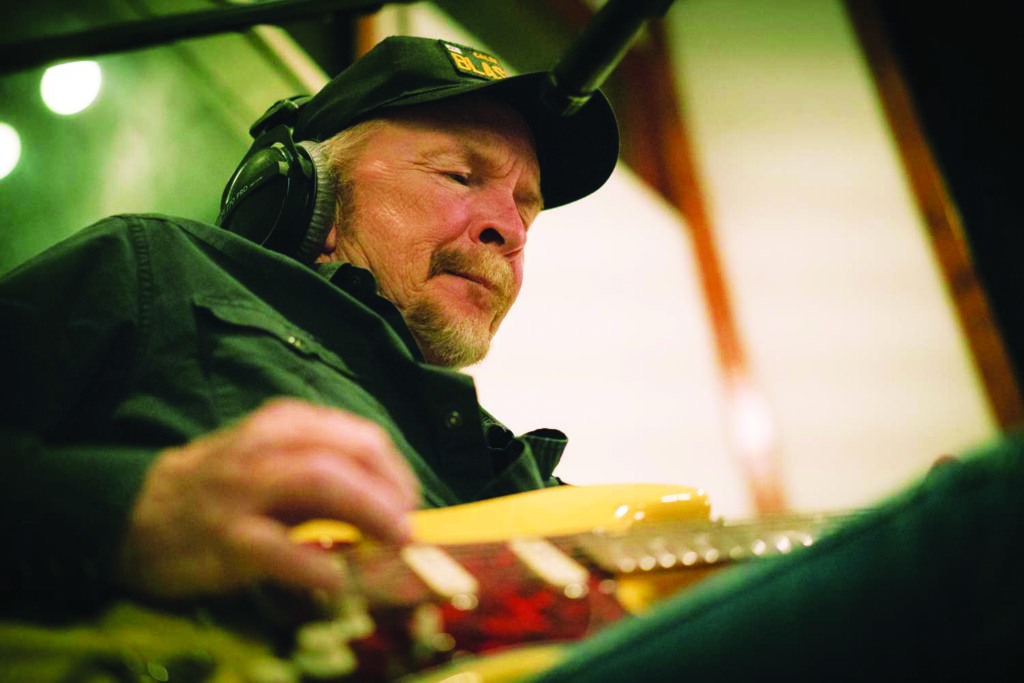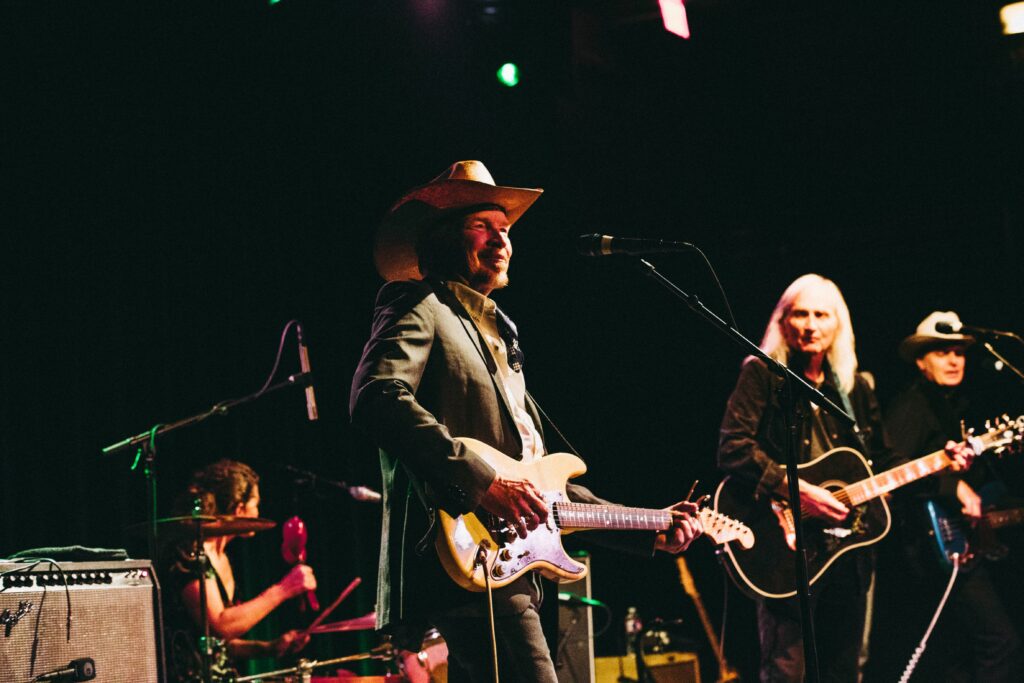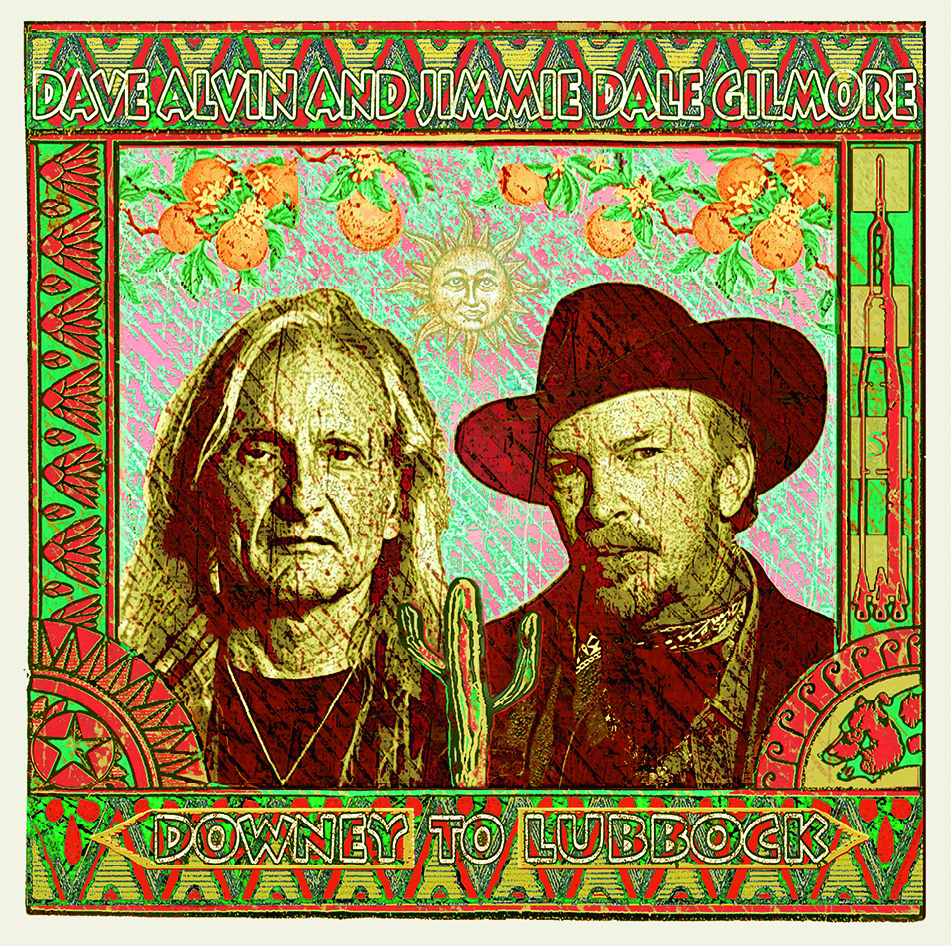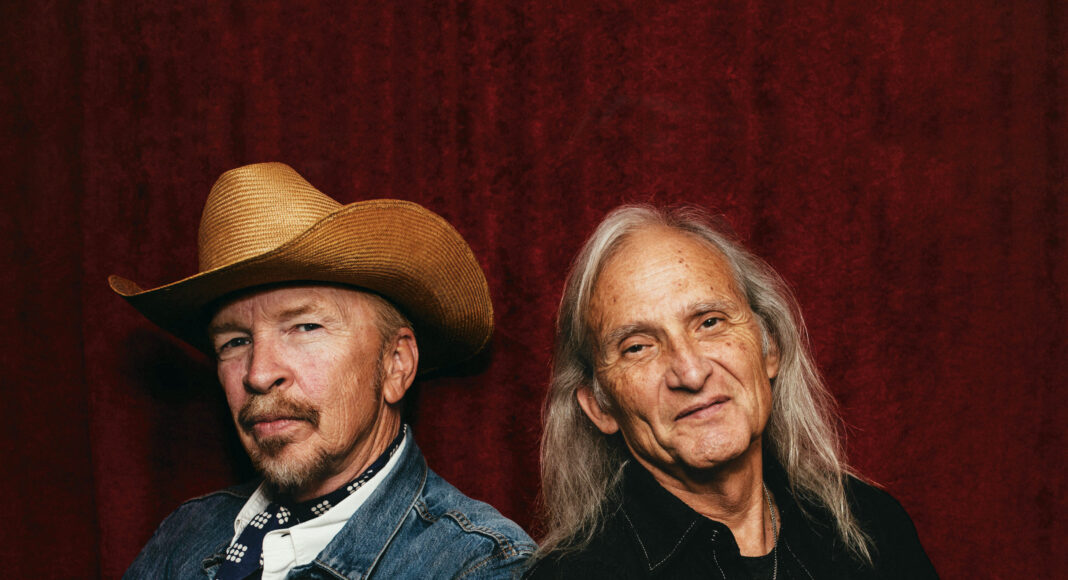Woody Guthrie’s song “Deportee (Plane Wreck at Los Gatos)” is not about the town in the foothills of the Santa Cruz Mountains. But you’d be forgiven for thinking that it is, because in the 74 years since Guthrie wrote it, the song has become even more relevant to this—and every other—region of California, a state where 1 in 3 workers are immigrants.
On January 29, 1948, Guthrie read about a plane that had crashed the day before in Los Gatos Canyon, near Coalinga in Central California’s San Joaquin Valley. Among the 32 passengers killed were 28 migrant farm workers being deported to Mexico. Guthrie, who lived in New York at the time, was angered that while the names of the flight crew were printed, the national press did not extend that dignity to the farm workers who died—instead, they were referred to simply as “deportees.”
In response, Guthrie wrote the lyrics to “Deportee (Plane Wreck at Los Gatos),” which was really more of a poem until it was set to music in the ’50s by a schoolteacher named Martin Hoffman.
Guthrie’s lyrics showed a surprisingly sophisticated understanding of what immigrant laborers from Mexico faced under the Bracero program that began with the Mexican Farm Labor Agreement in 1942, and lasted until 1964—limited protections for officially processed workers (who were, among other things, given physical examinations and sprayed with DDT at “reception centers”), and increasingly harsh penalties for those in the country illegally: “Some of us are illegal, and others not wanted/Our work contract’s out, and we have to move on/Six hundred miles to the Mexican border/They chase us like rustlers, like outlaws, like thieves/Goodbye to my Juan, goodbye Rosalita/Adiós mi amigo, Jesus y Maria/You won’t have a name when you ride the big airplane/And all they will call you will be ‘deportee.’”
It’s a powerful statement from a folk songwriter who by that point—at age 35—was an American legend, but whose incredibly prolific output in the 1940s was already coming to an end. For a long time after his death in 1967, some considered “Deportee (Plane Wreck at Los Gatos)” to be Guthrie’s last great song, although the release of the Mermaid Avenue albums by Billy Bragg and Wilco in the late ’90s and early 2000s proved that Guthrie had continued to write remarkable lyrics through the rest of his life.
Like the Mermaid Avenue songs, “Deportee” wasn’t popularized by Guthrie himself. It was when Pete Seeger began playing it in the 1950s that it caught on; since then, it has been covered by dozens of artists, from Judy Collins to the Byrds to Bob Dylan and Joan Baez to Bruce Springsteen, Concrete Blonde and Dan Bern.
In fact, no one knows the sheer number of artists who’ve covered the song quite like Dave Alvin, who decided he needed to hear how every single one of them had interpreted it before he and Jimmie Dale Gilmore could cover it themselves on their 2018 collaborative album Downey to Lubbock.

“That was a difficult one. Jimmie really wanted to do it, and I was game to do it,” says Alvin. “But the night before we went into the studio to cut it, I was up all night watching 150 versions of ‘Plane Wreck at Los Gatos’ on YouTube. Because, well, I didn’t want it to sound like all the others. There are some great versions, you know? And because it’s one of those things that had been done so many times, it’s like, ‘OK, how do I navigate this minefield?’”
The way Alvin discovered what he wanted their version to sound like was by first figuring out what he didn’t want it to sound like.
“I’ve used accordions on a lot of my records, I’ve used mandolins and things like that,” he says. “But with this, it was ‘no accordion, no mandolins,’ because that’s the first thing you hear in recordings of ‘Plane Wreck at Los Gatos.’ So it was like, ‘Okay, let’s try to make it ambient.’”
The result is a haunting, aching version that sounds like it’s sweeping over the very landscape once worked by the tragic figures Guthrie memorialized.
“Jimmie brings a lot of the heartbreak to it,” Alvin says. “Other people bring the politics to it. They’re both valid. But with this it was like, ‘Okay, what do we do musically around his voice?’ Because when he sings it, he means every goddamn word.”
“That song has always just touched me so deeply,” Gilmore says. “Because, you know, living in Texas, we have a little house down on the border, down in Terlingua. Butch Hancock [one of Gilmore’s bandmates in the Flatlanders] lives there full-time, and now we spend as much time as we can there. So we’re real connected with people that are affected by all the insanity of the border and the wall and all that stuff—all the stupidity. And I realized that Woody Guthrie, in this really subtle kind of way, had spoken to the ages about that. That’s why I started doing the song again.”
QUICK TO CLICK
To Gilmore—the Texas native who got his start in the early ’70s with legendary Lubbock alt-country band the Flatlanders, before finding solo success in the Americana radio wave of the ’90s that local stations KFAT and KPIG pioneered—the process that produced “Deportee” is an example not only of Alvin’s skill as a producer, but also of how much the duo complement each other.
“By the time we were making the record, Dave and I had already discovered that we were a very good team,” he says. “Dave fills in the gaps of expertise in the studio that I don’t have. I just don’t think in that way. I think purely in songs.”
It’s also an example of the dizzying organic quality of their musical partnership, which despite their 30-year friendship didn’t come about until Gilmore’s booking agent suggested it out of the blue in 2017. Both of them jumped on it.
“When Dave and I were on the road, we would just pull something out of a hat, because we didn’t rehearse or anything,” says Gilmore. “[‘Deportee’] was one of the ones that popped up, and after that Dave would request it.”
Guthrie’s song wasn’t the only tune they both knew, as they quickly discovered.
“We figured it was going to be a song swap thing. We knew that we got along well with each other, so we knew that would be fun. It was like an experiment, you know, like, a funny experiment,” says Gilmore. “But playing acoustically, both of us started doing the kinds of things we did before we were in bands. So, the stuff that you’re doing when you’re learning how to play. And both of us were blues fanatics. I don’t think we even had a rehearsal, we just jumped into the first gig, and almost immediately I’d start doing a song and he would just jump right in on it. He would already know it completely, or know it well enough that he could learn it within the first verse. And his playing—he’s such a much better guitarist than I am, that just really added something, it was really exciting to me. Then we started getting into harmonies and stuff. And then, really quickly on that tour, Dave said, ‘Hey, we’ve got to make a record together.’”
BACK TO THE BLUES
Alvin, of course, had gotten his start in the Blasters, which he and his brother started in 1979 in their southeast-L.A. hometown of Downey. Though it was a roots-rock band influenced by everything from rockabilly to blues to country, the Blasters were hugely popular within the L.A. punk scene, which had a bit of an Americana streak to it all through the ’80s. (Alvin also joined X for a while, and played in X’s country side project the Knitters.) Alvin’s love of the blues came out again on his first solo record, 1986’s Romeo’s Escape, and subsequent records.
His passion for the genre is no surprise considering that he spent his formative early-teen years hanging out at L.A.’s iconic Ash Grove club, which lasted from 1958 to 1973 and drew blues greats like Howlin’ Wolf, Willie Dixon, Mississippi John Hurt, and Muddy Waters. What Alvin didn’t know until he started performing with Gilmore is that during a short, pre-Flatlanders period in which Gilmore had lived in L.A., he’d also hung out at the Ash Grove, and had even gotten to be friends with Lightnin’ Hopkins, one of Alvin’s musical idols.
The Ash Grove gets a mention in the album’s title track, a burning blues-rocker that cleverly lets both musicians testify to their musical histories, while at the same time imagining what would happen if Alvin—whose most popular album is King of California, and is so Cali to the core that he wrote a song about Highway 99—transplanted himself from Downey to Lubbock, and Gilmore did the opposite.

“I’m a wild blues blaster/From a sunburnt California town/And I got a loud Stratocaster/That can blow any roadhouse down,” sings Alvin, while Gilmore replies in the next verse, “Well, I’m an old flatlander/From the great high plains/Like wanderlust and wonder/West Texas wind blows through my veins.”
The funny thing is that neither move would be such a stretch. After all, one of Alvin’s best songs is “Abilene,” about the Texas city (and a girl named after it), and Gilmore did dip his toes in the California hippie-cowboy life.
“You know, there’s not that much difference, really, between Downey and Lubbock,” says Alvin. “They’re both flat.”
Once he understood the depth to which Gilmore shared his passion for the blues, Alvin sought to bring that out on record for the first time.
“The thing about Jimmie Dale is he’s an incredibly unique songwriter with an equally unique voice,” says Alvin. “His records, some of them captured him perfectly, and others, maybe not quite so much. But, you know, you can say the same about me. But one thing that kind of got overlooked or pushed aside was Jimmie Dale’s a hell of a blues singer. And when we started doing the gigs together, the more blues stuff I played, the more blues stuff Jimmie Dale would pull out. And I was like, ‘Man, you should make a record of that.’ So when we went to make the record, I was kind of leaning towards the two things Jimmie Dale’s never done—he’s never made a bluesy kind of record, and he’s never been in a rock ’n’ roll band. I mean, a flat-out rockin’ band, you know? It was great on the tours that we did together to watch him rockin’ out sometimes, like he was leading his high school band. I saw that in him, and he always, I think, saw that in himself, as well. I think that that’s one of the reasons we worked very well together.”
SECOND CHANCE
The pandemic, of course, derailed plans for more touring, but it wasn’t just that. In May of 2020, Alvin was diagnosed with prostate cancer, the beginning of a two-year battle that included months of chemotherapy and radiation. He kept his health struggles private, but Gilmore says the band knew something was very wrong while they were touring in 2019.
“On the last tour, Dave was showing some signs,” he says. “It never impacted his performance, and he didn’t talk about any health issue or anything, but you’re traveling in a van together, you know? I mean, it was subtle, because Dave would not complain, ever, about anything. And when it really got serious, he didn’t want to talk about it.”

Eventually, though, Alvin did open up about it to his close friends, and Gilmore and his wife went and spent a week with him after his surgery. The rest of the world, however, still didn’t know.
“He didn’t want us to talk to the press about it,” says Gilmore, “until he got to a place where he felt like he had kind of conquered it. Which happened, he did get to that place. But it was … it was frightening.”
In April, Alvin announced he was cancer-free. Explaining his health situation now, he says, “It’s good as of this moment, which with the cancer monster is the best that you can hope for. It can come back at any moment. So I am knocking on wood that it doesn’t, and proceeding as if it won’t.”
For a musician who in Gilmore’s estimation of his friend “wants to be playing his music for real people live every night,” their new tour together, which comes to Moe’s Alley on Tuesday, June 21, is everything Alvin could want. Although he’s pretty damn happy about life in general right now.
“To be alive, to be out of a hospital, is a great feeling. It’s the greatest feeling ever,” he says. “I gotta admit, there’s times where I’m not this cosmic about it, but overall, the way I view things now is I had a pretty good life. That was a nice chunk of cake. And now what I’ve got, you know, is the frosting part. These upcoming gigs just mean the world to me. I’m living for them. Because it’s like even the bad notes will be frosting. And I predict there will be some bad notes. But what the hell? They’re frosting notes.”
JIMMIE DALE GILMORE AND DAVE ALVIN play at 8pm on Tuesday, June 21 at Moe’s Alley, 1535 Commercial Way in Santa Cruz. $30/$35. moesalley.com.















God I want to be there! I would pay for being live on my phone!
LOVE TO YOU BOTH, YOUR FAMILIES AND FELLOW GIG ARTISTS!
Saw you two at the Troubadour a few years back.
Phenomenal storytelling combo, guys.